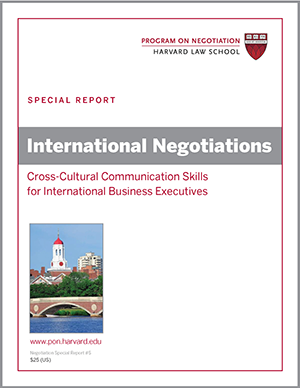
Adapted from “Negotiating Like a Diplomat” by Max Bazerman for the July 2006 Negotiation newsletter.
Max Bazerman has had extensive experience teaching corporation’s executive negotiation courses. In addition to the faculty and students, some of his sessions have been attended by high level former diplomats who had worked on cases discussed in class. The diplomats were invited, where appropriate, to provide insight into local customs, changing politics, and business norms. They provided that knowledge – and much more. The diplomats taught the groups, faculty and executives alike, to think more broadly about information that is not obviously relevant to a given negotiation but is crucial nonetheless.
Here are some of the important questions the diplomats posed:
- How will different owners of a potential partner firm in the foreign country react to the interests of a multinational?
- How will changing local laws affect the wisdom of the transaction?
- What opportunities for learning are being created?
It became clear during the discussion that the diplomats were asking questions that the executives had not yet identified as areas of concern; if they had done so, the corporation’s business-development activities would have been more successful.
What did the diplomats bring to the discussion?
A more inclusive mindset.
Their questions broadened our awareness beyond the scope of the teaching plan in very interesting and productive ways.
Clearly the diplomats had a trained ability to think about the big picture of a given negotiation. They asked questions that did not occur to very high level and successful executives or business school professors.
This tendency to think in broader concentric circles is a skill that would serve all negotiators well. It’s particularly important when the rules of the negotiation are foreign and unfamiliar.




